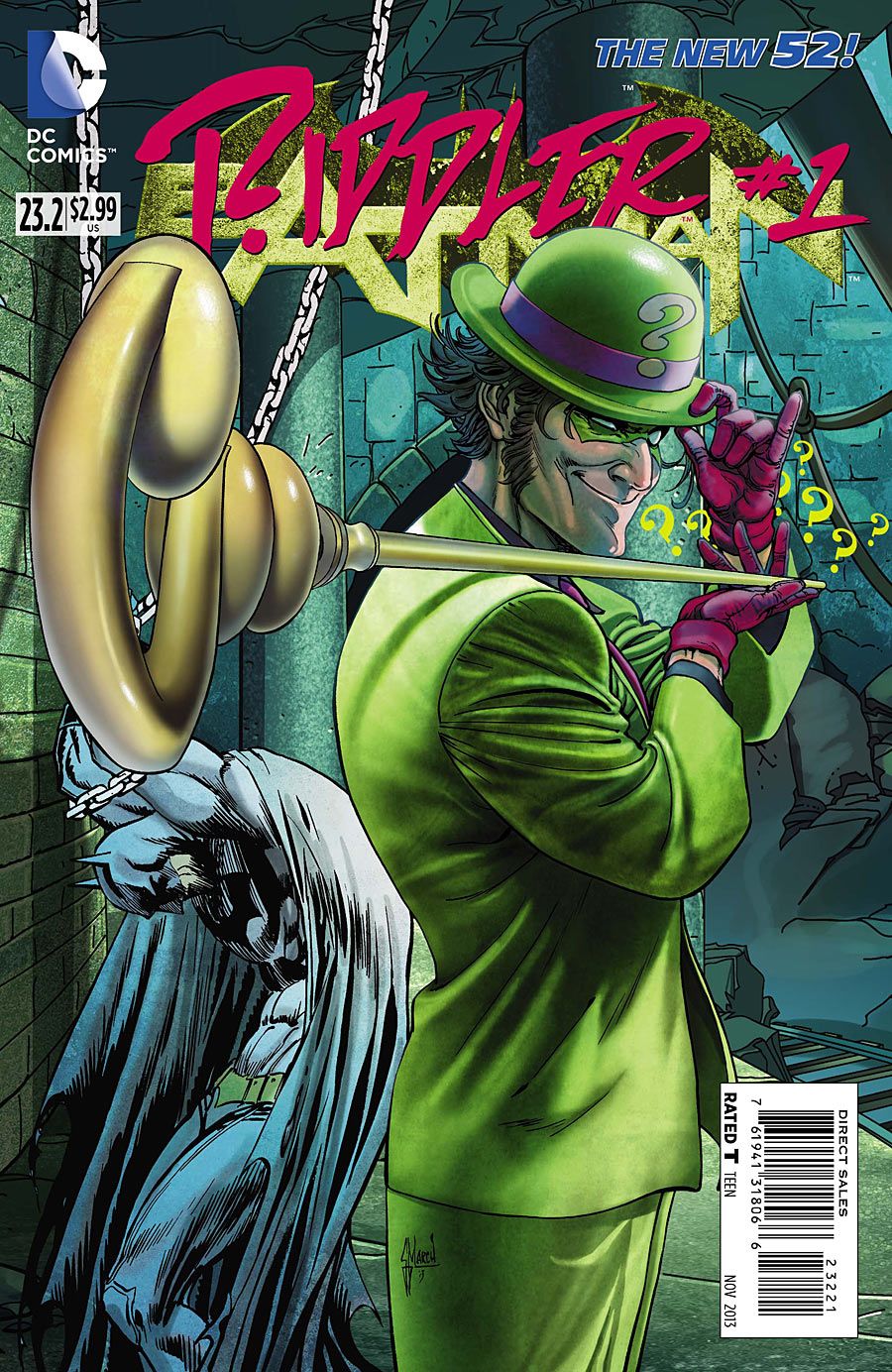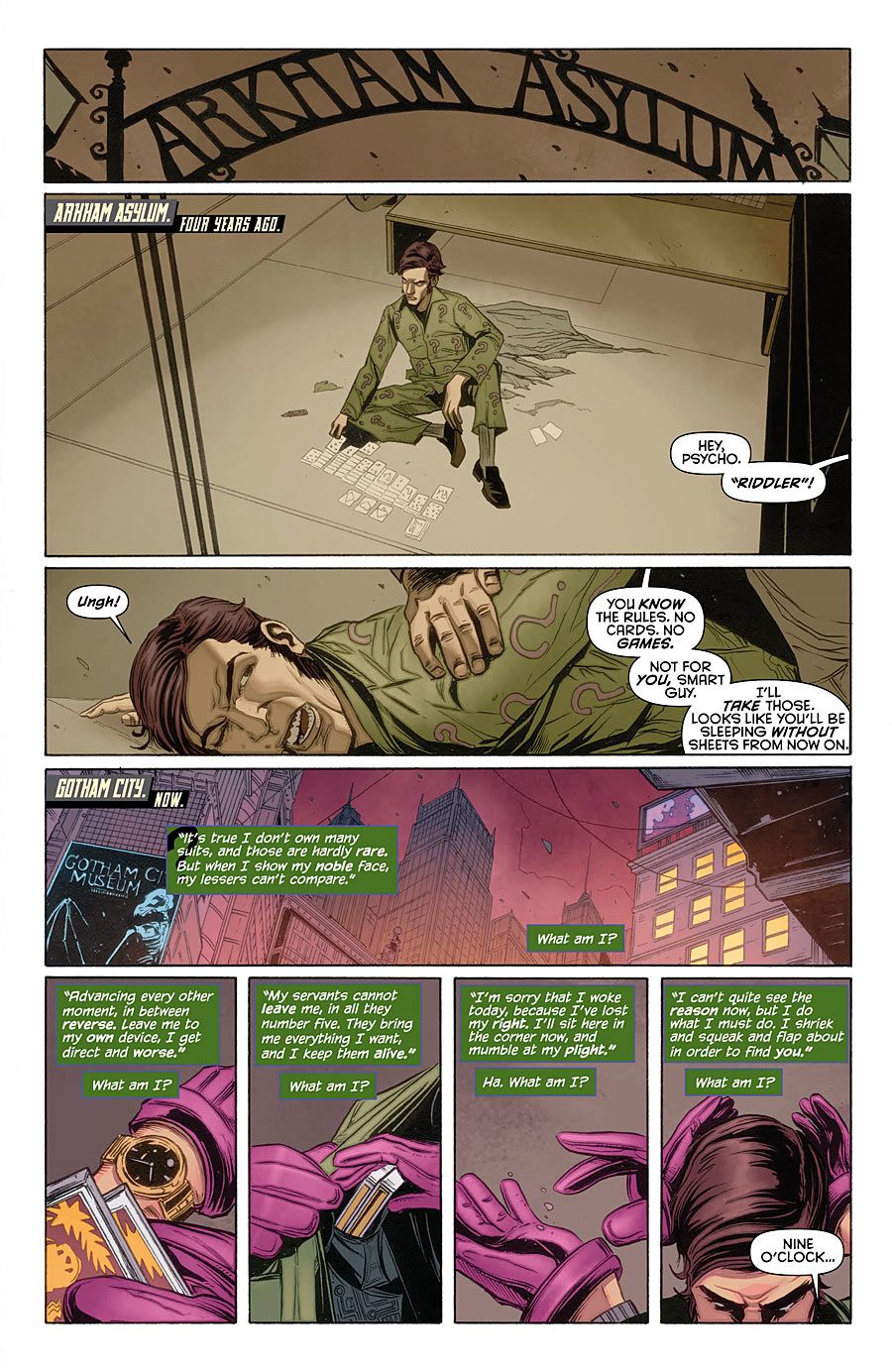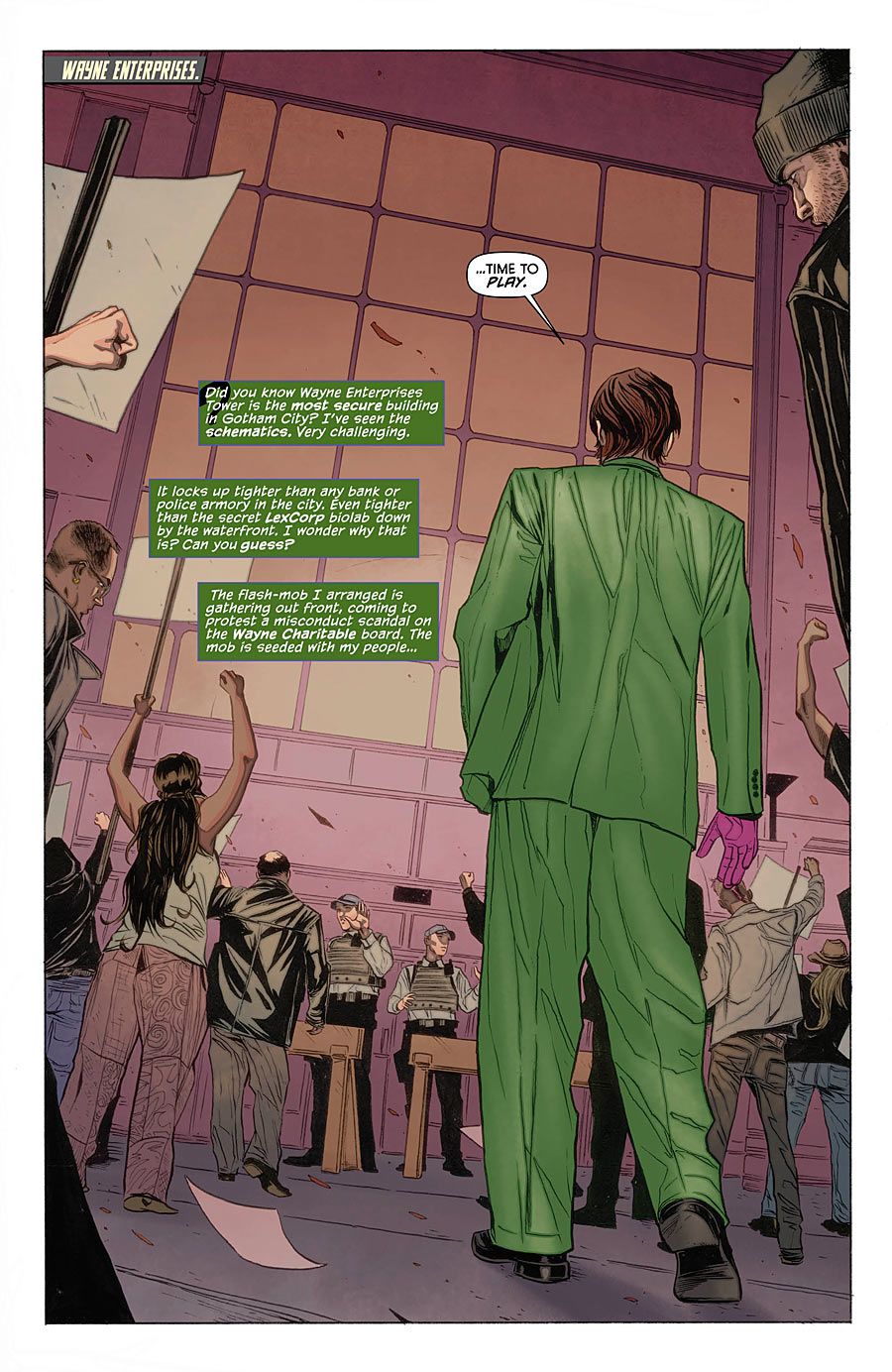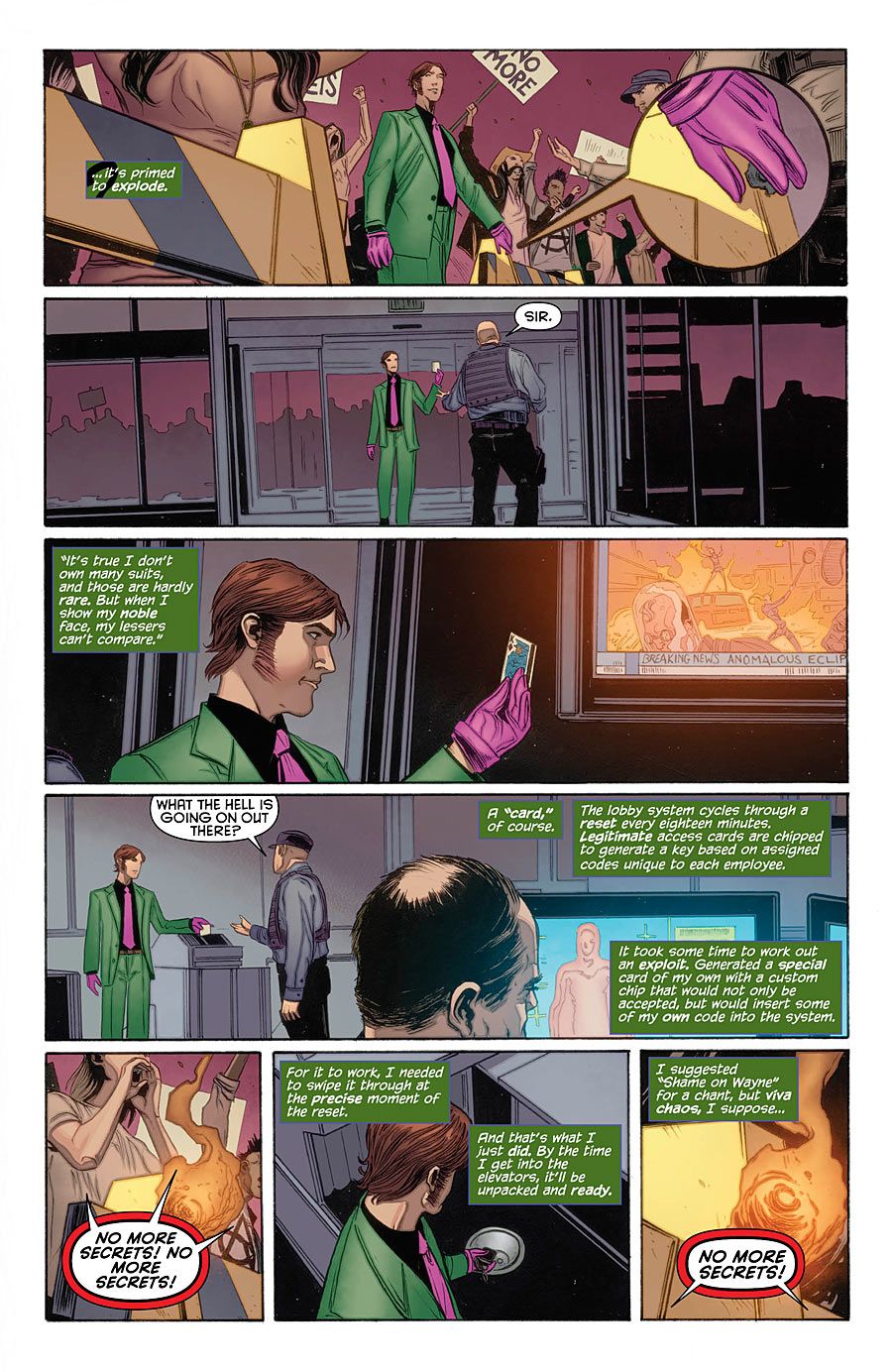If you made a list of white-hot books at DC Comics right now, writer Scott Snyder would undoubtedly dominate the top.
The man behind the mega-Batman epics "Death Of The Family" and "Night Of The Owls", as well as the the acclaimed Eisner Award-winning Vertigo Comics series "American Vampire" and miniseries "The Wake," Snyder extended his world-building reach earlier this year to include Superman. With DC Co-Publisher and artist Jim Lee, Snyder launched the brand new ongoing series "Superman Unchained," introducing the character of Wraith and the idea that, unbeknownst to Clark, the US military has had their own version of the Man Of Steel aiding them since World War II.
With "Zero Year" wrapping up the first part of his three-part "Batman" origin story and "Superman Unchained" soaring into its fourth issue this October, Snyder took a detour from his Gotham-Metropolis commute to drop by Comic Book Resources to speak about whether the Red Hood is Joker, his Golden Age Vs. Modern Era take on Superman and what's next for Batman after "Zero Year" concludes.
CBR News: "Superman Unchained" #4 is out next month, and you've said before that if you got just one chance to tell a Superman story, this is the one you'd tell. What was the genesis -- did this story begin with the idea of the new character you've introduced, Wraith?
Writer Scott Snyder handles two of DC's biggest guns in "Superman Unchained" with Jim Lee and "Batman" with Greg Capullo
Scott Snyder: Yeah, he has been in my mind for a while. The idea really came from me looking over a couple of old Superman books that I had. They're collections I've had since I was a kid, they're big hardcover books that are just "The Greatest Superman Stories" and another one just says "Superman" on the spine. They collect some of the earliest Siegel and Shuster storylines, and I was noticing as I was looking back at some of them how political they were. Superman fights the Nazis; some of the images on the covers of them were Superman swimming towards a Nazi sub or holding up the Liberty Bell fighting Nazis, things like that. They were so politically invested and so ideologically of-the-moment it got me thinking of this almost ghostly Superman that doesn't exist anymore. This Superman that was a big part of world events, and did fight on the side of the United States in the War.
It also got me thinking about the big question of whether or not Superman today would participate in the kinds of military operations we might be involved in, and whether or not it could be compared to the more black-and-white ethics of the comic strips back in the day where he was fighting Nazis and it was just good and bad. So I started coming up with this character, Wraith, who is almost a ghost in American history, he's this hand that moves American military history forward. I wanted him to be stronger than Superman and older, and also have a similar physiology so he has powers that Superman might develop down the line and he can teach Superman how to use more effectively. So yes, he's been a character in my head for a really long time and I'm very excited that he's finally out in the world.
It's interesting because he is clearly more physically intimidating than Superman, but when you meet him he kind of seems like a nice guy? [Laughs] But really, the one who comes off scary in that encounter is General Lane because it feels like he's more of a threat to Superman than the giant alien.
Yeah, that was the big challenge honestly, not making Wraith a mustache-twirling villain and at the same time General Lane, who is more an open antagonist, have them both scary in their own ways. To me Wraith is scary because he believes deep down, at least as far as you can tell, that he's doing the right thing. He says in issue #4, "My people sent me here through space to get me here this fast because they wanted me involved, and I landed where I landed because they believed in pushing things forward by helping the country they thought deserved help." Superman, [Wraith] makes the argument, Superman landed in Kansas and in this country for a reason so why doesn't he become more involved?
The accusation Lane makes is that [Superman] floats above, so they represent two different sides of the coin in that argument. Lane really is aggressively angry with Superman, almost like a disappointed father. He believes Superman could have been a huge help but he won't be, and Wraith is there as the glowing son. Yet at the same time, all it takes is for Lane to say, "Kill him," and Wraith will. That's one of the things he addresses in the next issue too, this remorse, because [Wraith] says eventually it's bound to happen. He's like, the country of the world all have anti-Superman weaponry at this point, because what would happen if they or the United States made a decision militarily you don't agree with? If you stand in their way I'm coming for you, so let's just enjoy this while we can because that black day is coming when I'm going to have to beat you down.
At Comic-Con International you spoke about how Wraith was Superman's "nightmare," precisely because of that and his involvement with Lane and the Military. A hero's greatest fear coming true is such a large theme of your run on "Batman," is this also the big theme for "Superman Unchained?" Or are you going after the more classic Superman Vs. modern ambiguous Superman?
"Zero Year" is intended to add as much to Gotham's history as it does to Batman's
I think it's both. I feel the best way to be effective as a writer with characters that are iconic is to figure out a way of getting at the thing I find most interesting as an Achilles heel. Often it's a flaw that makes them a greater hero. With the Joker, the thing I was after was his dependence and his affection for his allies. That's something that makes him a better hero, in the long run, and a better person but it's also easy to say, "It makes you weaker than you used to be," and come after him that way. They're meant to be very potent emotional and psychological attacks. Similarly, here it really is something that makes Superman question how he does things.
Lois is also very important to him too because, in this story in particular, she reminds him of the person he wants to be both in and out of the costume. He admires her tremendously and as the story progresses the person he becomes, he both needs to remember who he was and also be a partner in stopping what's coming.
Before we switch over to "Zero Year" in "Superman Unchained" you're working with Jim Lee. I know that you and artist Greg Capullo collaborate a lot on the direction of "Batman"; how similar is your process with Jim?
I write the same way I write for Greg in that I write full scripts, and then there's a caveat at the beginning of every script that I put there, now as a formality because I know that's the case, but it just says, "If you have a better way of doing any panel, any page, any sequence, I want you to do it your way and totally forget there's a script." Greg and Jim both I hope enjoy that! [Laughs] I know Greg says he does, and Jim says he does too! Even today Jim sent in a page that had a different arrangement than anything I had thought of, and yet it made the page much more emotionally potent. You see Superman from a totally different vantage point, from a very close up angle instead of the distant one I was suggesting.
That's one of the fun things about working with guys like Jim and Greg, and Rafael Albuquerque and Sean [Murphy]. I love seeing what they come up with so it is very collaborative. Working with these guys you develop a shorthand; what I try to do with every sequence is figure out it emotionally, beat to beat, so I'll say to Jim, "This conversation between Superman and Lane is about reducing Superman's confidence, making him feel that not only he's outmanned but everyone in the room believes it, and Superman does too, a little bit. However you want to do that, go for it." That's about as far as I go directing visual, and then I work on the dialogue and leave paneling up to them. It's funny, I look forward to seeing my script change more than seeing it materialize as I've written it.
With "Batman" we're in the middle of "Zero Year" and you just did the Riddler one-shot for Villains Month, and you have the "Zero Year" tie-ins coming up in November. How do these pieces all fit into "Zero Year?" Do the November tie-ins affect the main Batman story?
Both of those things are outside of the main story. To be totally frank, doing "Zero Year" it was important to me to have it be one monolithic story and that it would be closer to "Black Mirror" than a story like the Joker where there were so many books that showed so many different angles that you got a big robust story if you picked up everything. I always make it clear with every "Batman" story that you'll never have to read another book, you'll never have to read any other series to get the whole story. You'll get a fuller picture if you read them, but you can just read "Batman." With this I really wanted a world to play in that was totally mine, and the way we're going to twist Gotham -- you got a glimpse of it in issue #21 -- but the degree to which It'll become a wild city and completely ungoverned is something I wanted to be able to have without having to deal with continuity across the board. If it was happening in the present Superman would come help and Flash would come help; I didn't want that in the story. I wanted it to be exclusively Batman before we even knew there was a Batman. So when I pitched it to DC, they agreed and I started writing it.
Then DC asked if I minded if some of the stories showed where their characters were in "Zero Year." My first impulse was to say, "Yeah, I would mind," and I turned it down. But then I started talking to the writers, like [Jeff] Lemire and Greg Pak who I became really close with, and they both had stories they wanted to do with their characters and I really liked their take, that "This is what Ollie would be and he'd be in Gotham for this reason," and Greg said, "Well this is why Clark would try to help Gotham at this moment, and this is his power-set." I liked those stories enough so I said, "If you guys want to do those stories you should do them. I'm not going to have Bruce affected by anything that goes on in those stories." But they are really good stories in their own right, and it was fascinating to see the characters in these prototypical situations. Superman's going to be in Gotham for what the Riddler does and also this super serum that's heading toward the city and he's trying to stop, and Ollie is there for business reasons.
With the Riddler one-shot, at first I wasn't going to do a Villains story because I was so involved with this. As it got closer I was talking to Jim Lee actually, and he was saying it was shame not to do a story that shows where he is now because he's so important to the gallery of DC's greatest. So I agreed, and Ray Fawkes and I plot it but it's written by Ray Fawkes as well. I know a lot of people think I wrote it but it's written by him, and it catches you up and where the Riddler's been in "Forever Evil," but it also has a couple nods to "Zero Year," too. I think it's a really great Riddler story from Ray and it adds a fun dimension to how he thinks of himself in the present compared to how he thinks of himself in the past.
Riddler and Red Hood are the villains in focus in "Zero Year." Contrasting the two, we know Nigma, who is much more of an egomaniac, will become Riddler and the deranged Red Hood is in some way connected to Joker. Why use these two specifically in "Zero Year?"
I think the fun of "Zero Year" for me, and I hope for other people, is to see where characters come from and change the city or are changed by the city. I've said this a lot, but the story is segmented, it's broken into three sections. The next issue, #24, is this huge, oversized 58-page finale of the first part with the new Batman suit, all of the mythology coming to a head where you see what happens to the Red Hood leader. All those questions will be answered in terms of what his relationship is to the Joker in this issue.
But what I wanted to do with the story is talk about how the whole mythology formed as the city's bones break and are put back together because of these different incidents. The city is almost reborn with Batman and these villains. The fun for me is to see -- again, not definitively saying this is the Joker with Red Hood, read and find out! -- what, if you saw the Red Hood as a threat to the entire city and a possible prototypical Joker, what would his philosophy be? What would his endgame be? What would change him into the Joker beyond falling into a vat of toxic waste? I love the idea that people get so angry that they think I would do a definitive origin of the Joker. Not going to lie, I get a lot of these, "If you do that Snyder, I'm done! I'm dropping the comic if you say this is the definitive Joker!" [Laughs] To all who want to know how definitive it is, stay tuned and I hope you trust us to handle it the right way. At the same time, walking that line and showing a new take on who the Joker might have been is something that's very important to me.
Similar with Riddler, I wanted to show how he was a guy with purpose. In our version of him he's existed behind the scenes because of his background; he's the man behind the man, the strategist and the smartest guy in the room. He's so boastful, but his name is never on anything, Edward Nigma is just an alias, obviously, it's a ridiculous name. It's his online name or his alias to cover who he was. I wanted to show him at the same crossroads that Red Hood is; do you change with the city because of Batman and evolve into this thing that becomes eternal and mythological, or do you step back and let the city change without you? That's the question I'm trying to pose.
Man, I feel like I just made it sound like that completely, definitively this is the Joker! [Laughs] The controversy of that is fun to have in anticipation of the next issue, but don't worry too much! Go take a look at it and see what you think because we're really proud of how we handled the "Is this the Joker/is this not the Joker" question.
You know after this you're going to get someone with the Twitter handle "Ed Nigma" popping up to ask you about that.
Yeah! [Laughs]
Looking past "Zero Year" at Comic-Con again you said that after this story you wanted to get back to the "CSI Batman" with the emphasis on him as a detective. What are your goals after "Zero Year?" Do you want to refocus on quieter, more detective-based stories than what we've seen from the comic in recent arcs?
I would say we have really good plans for the better part of 2014, which is in fact Batman's 75th anniversary. I definitely have a really fun, smaller palette cleanser story afterward that deals with Batman and his cold cases, the things he's never solved, and it gets back to really small detective work. But if you think we're not going to big again on the 75th anniversary, you don't know us at all! [Laughs] We're going to gear up and go huge for that! "Zero Year" is big, as big as we can go, then we're going to give you a bit of a palate cleanser before we try and go big again.
I've said it before but I honestly mean it from the bottom of my heart, I know there are thousands of people with a Batman story they want to tell and it's the ultimate Batman story to them. I really believe that if you're writing these characters that are so iconic and you're not trying to do that every arc, not tell the most important stories to you, the ones you can die happy knowing you told that story, you might as well move over and let someone else tell their dream Batman story. As much as people like to say, "why don't you do some small stuff," and we will do that here and there, the plan is always to do the big Gotham-shaking stories. Not because they are spectacular and giant and summer blockbuster-y, but because they are personal and give me the most room to fully explore the character.
Since we're talking about Batman's beginnings, let's bring this full circle -- the very first time I spoke with you about Batman all the way back when you were on "Detective Comics" you told me that it was fun because your son thought you were actually going into the office everyday and physically bossing Batman around. Does he still think that? [Laughs]
I know, now I just travel through the ice to the Fortress of Solitude in my parka! [Laughs] He's older now, it's really funny -- he kind of understands I write these characters but he still doesn't quite grasp the concept in other ways that you're not their boss. He knows I don't meet them, but now I think he thinks I write e-mails to them. "This is what you're doing Bruce, this is what you're doing Clark." It's a good age! [Laughs]
"Superman Unchained" #4 and "Batman" #24 both hit shelves October 9.






